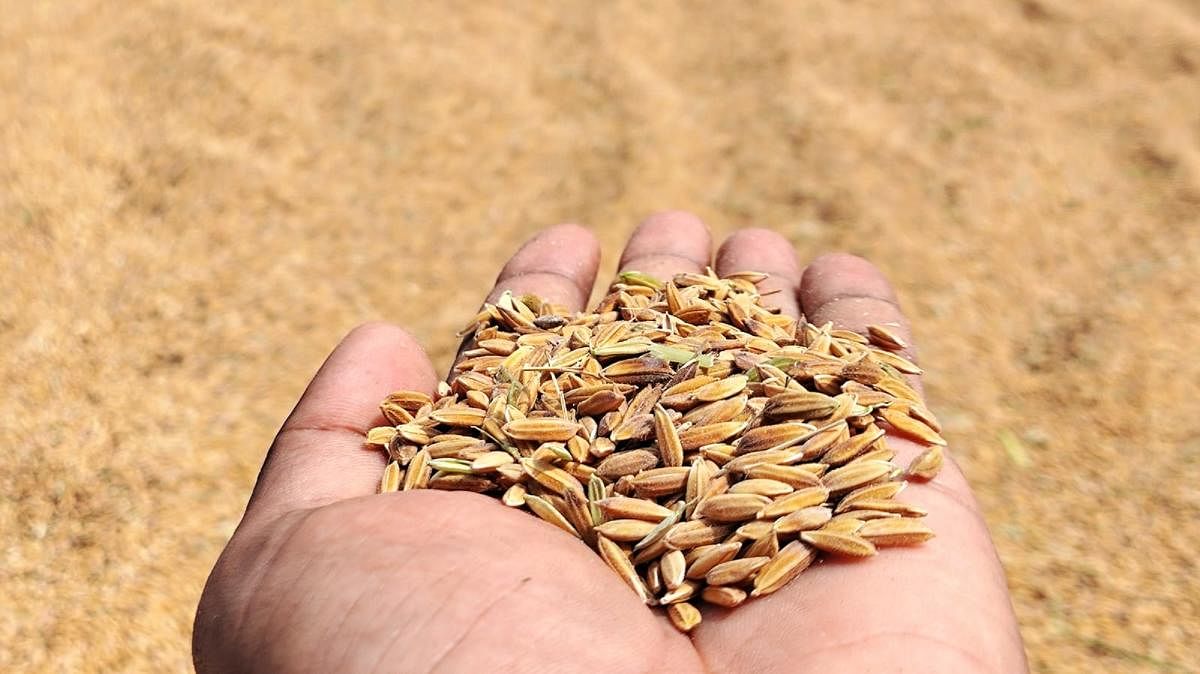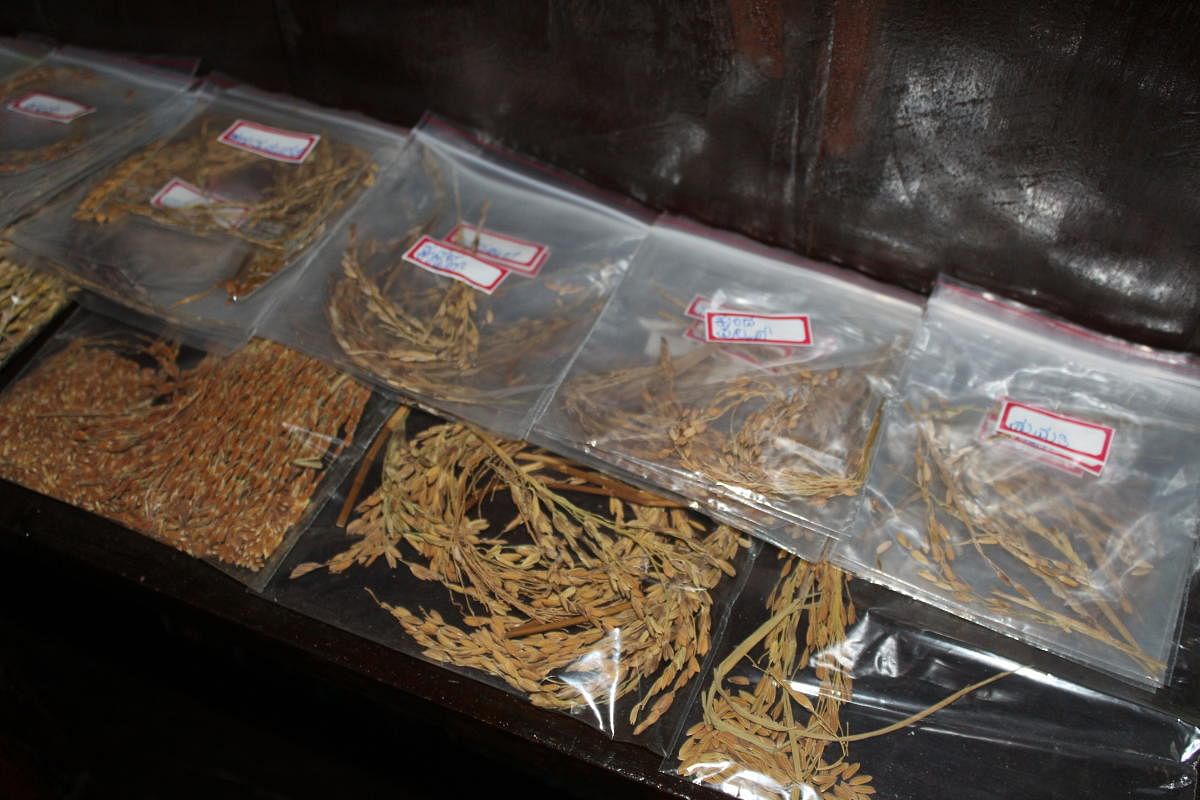

Several slender, green rice seedlings in containers sway gently with the evening breeze, seeming no different from each other. Yet, they are plants of hundreds of different varieties of rice.
Abobakker and Asma Banu’s garden in Murathangadi village of Karkala taluk, located about 47 km from Mangaluru, has over 600 native rice varieties. Soon, the grains will be harvested and sun-dried, before being stored in bottles to be conserved for coming generations. Some of the varieties will be propagated, by sharing the grains with other farmers.
While Abobakker works as a manager at a hotel in Karkala, Asma teaches at a government school in Pervaje. What drew this couple to the hobby of paddy conservation? Six years ago, motivated by a desire to eat pesticide-free rice, Abobakker rented fallow land and began cultivating traditional rice varieties. He avoided both, chemical fertilisers and organic manure, allowing the seedlings to grow naturally.
Keeping some of the harvest aside for his family, Abobakker distributed the remaining rice to friends. His rice was also offered as ‘Naivedya’ at a temple in Udupi. Now, Abobakker hopes to involve more farmers in his initiative so that they can supply pesticide-free rice to the temple for offerings throughout the year.
Native varieties
The organic rice cultivation effort picked up steam when Abobakker saw 150 varieties of rice displayed by Anjanaya—a farmer from Shivamogga—at Nudi Siri Sammelan organised in Moodbidri.
The Sammelan proved to be an eye-opener. “I realised the need to conserve native rice seeds, as the next generation may not even know about the existence of these varieties,” Abobakker says. From then on, both he and his wife, Asma, began collecting and growing traditional rice varieties.
The couple’s new-found passion has helped them bond with other seed conservators. They praise the efforts of Bore Gowda from Mandya, who has a rice variety (Sidda Sanna) registered in his name. Another farmer in Kasargod district, Satyanarayan Beleri, had offered them 80 varieties of seedlings in containers, upon learning that they had lost their rice seedlings after planting them in grow-bags.
Their goal to collect 1,000 varieties of rice has taken them to different states. Asma recollects collecting a seed variety which yields within 45 days, from a farmer in Nagapattinam district in Tamil Nadu during the recent Dasara holidays.
Passing on the passion
That their children, Afran, a 1 PUC student, and Mariyam, a sixth grader, share their passion, is quite evident.
“The most important variety in our collection is 'Jugal' from West Bengal. A single grain has two seeds,” explains Mariyam, as she breaks open the grain to reveal two rice seeds.
“Both Afran and Mariyam can easily distinguish between the different varieties of rice. They are the ones who label each container with the seed’s characteristics, duration of the harvest cycle, region of origin and colour,” says Asma.
The family's efforts have inspired entrepreneurs like Venkatesh Mayya, who owns a construction business in Mangaluru. Mayya learned about the couple’s paddy conservation efforts through a video uploaded by students from Alva's College on YouTube.
"The couple serves as role models for me in paddy farming," adds Mayya, who razed a rubber plantation in order to grow paddy on his sprawling 25-acre farm in Baradi in Karkala taluk.
Following Mayya's invitation to collaborate, Abobakker and Asma have grown ‘Kalabhat’ (black rice), ‘Gandhasale’ (a scented variety), ‘Rakthashali’ (red rice) and other varieties in about four acres of land. The crop will be ready for harvest in mid-November. Mayya notes, "Abobakker does not even wait for the workers and goes about planting seedlings in the field." He has succeeded in growing the rare Nagasampige rice variety, Mayya adds with pride.
The rare variety was also sought after by Pushparaj Ameen, a farmer from Nadi Kudru near Padubidri in Udupi district. He collected rice seeds of the Nagasampige variety from Abobakker, and sowed them on his 1.15 acres of land.
"I blindly followed Abobakker's advice and after 50 days of sowing, I harvested the crop just yesterday. This time, I did not spend any money on pesticides or compost and I was able to harvest about 1,500 to 2,000 kgs of rice, which is the same as the yield of the Jyothi variety I harvested a year ago," says a beaming Pushparaj.
Research interest
The campus of Alva's Education Trust in Moodbidri also houses fruits of the couple's labour. Rajavarma Bylangady, who assists the Trust in organising Krishi Melas, says, "Under our 'Krishi Siri initiative', with the couple’s support, 530 varieties of rice are being grown in pots and grow-bags on an experimental basis." From next year, the seeds will be conserved, and the plants will be on display to the public, he adds.
“The couple has rice varieties not only from coastal districts but also from other states. Their interest in paddy conservation needs to be appreciated,” says Shridevi A Jakkeral, Junior Rice Breeder, Zonal Agricultural and Horticultural Research Station (ZAHRS), Brahmavar, who had visited the couple’s house in Murathangadi.
Other horticulturalists agree, “Abobakker is neither a farmer nor does he own land. Yet he has embarked on this mission, without a motive for profit,” says Ullasa M Y, an assistant professor at the University of Agricultural and Horticultural Sciences (UAHS), Shivamogga.
Looking back at their efforts, Abobakker says, “If there is a will to grow and conserve paddy, you do not even have to own land.”